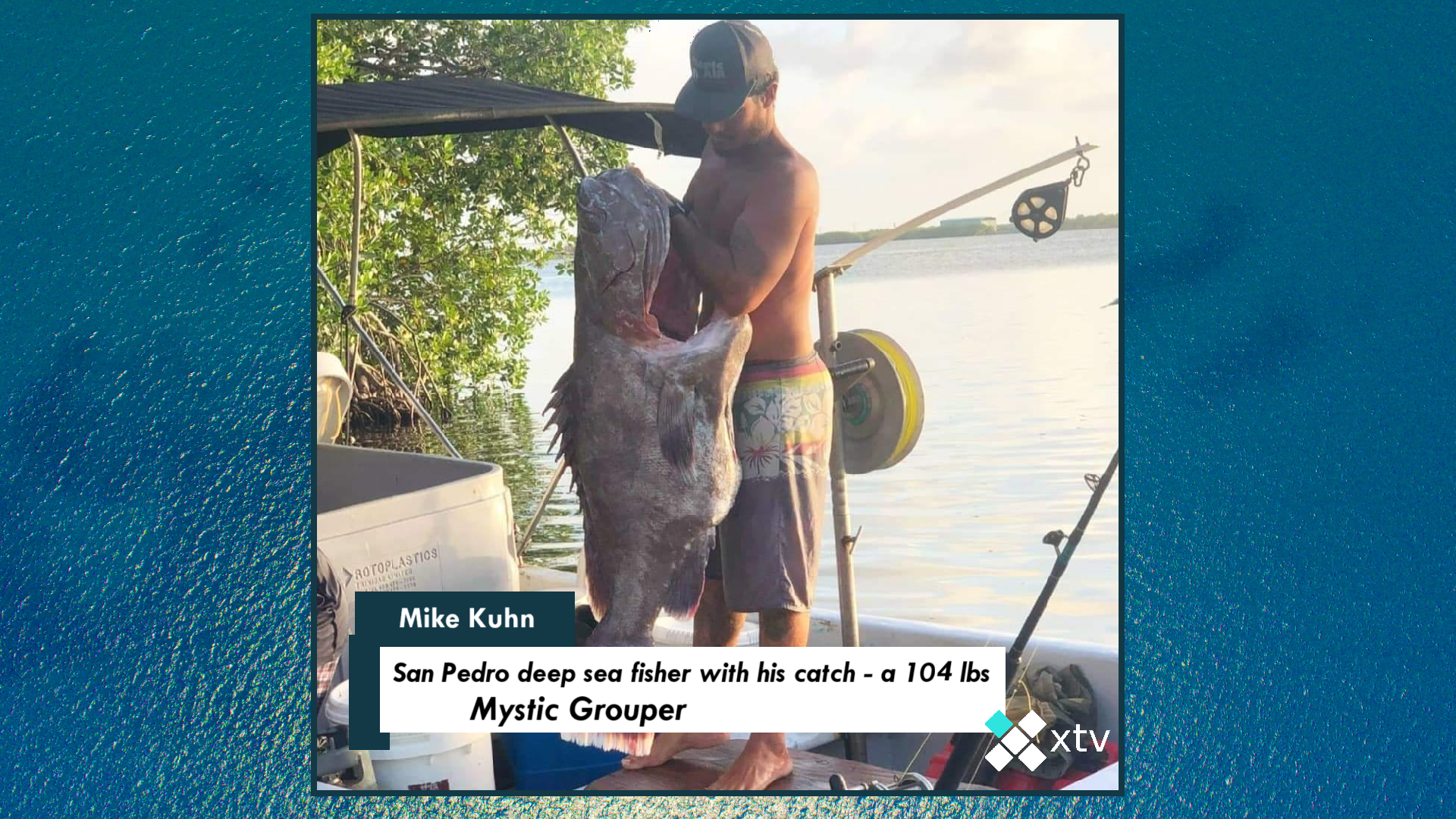By Alindy Marisol Amaya – XTV/KREM News
As Belize looks to explore its vast Exclusive Economic Zone (EEZ), local fishers seem pitted against foreign interests. Rumours of Taiwan’s fishing ambitions and the reality of Honduran exploitation stir controversy. Our in-depth investigation examines the stakes for Belizean fishers, the government’s plans, and the potential impact on the nation’s marine resources.
“This story was produced with support from the Earth Journalism Network (EJN).”
Belize sets sight on exploring its EEZ
For decades, Belize’s territorial sea (12 nautical miles seaward from all our fringing reefs, cayes and atolls) and parts of our internal waters have sustained our artisanal/small-scale commercial fisheries sector. However, under international law, Belize also has use and management rights to an Exclusive Economic Zone (EEZ) that extends 200 nautical miles beyond the territorial sea. Belizean fishers can therefore access it, but they don’t.
In fact, not even the Belize Coast Guard currently accesses our EEZ – unless they have direct intel (mainly drug-related). Trying to bridge this enforcement gap, the force plans to ink an agreement this year for a 2025 acquisition of two 25.9–33.5-meter coastal patrol vessels for US$10 million. Only larger vessels can safely operate in open seas for extended periods.
By official accounts, Belize’s fishers number around 3,400. They have registered over 800 primarily Mexican skiffs (23 to 25 feet long) for fishing in our internal waters and territorial sea. Their stomping grounds are mainly along the shallow waters of Belize’s Barrier Reef and the three offshore atolls: Turneffe (20 miles from Belize City), Lighthouse Reef (50 miles east of Belize City), and Glovers Reef (50-60 miles from Dangriga). Almost 800 fishers report accessing the deeper waters of our territorial sea designated as Area 9 under the Managed Access Program expanded to all our territorial sea in 2016.
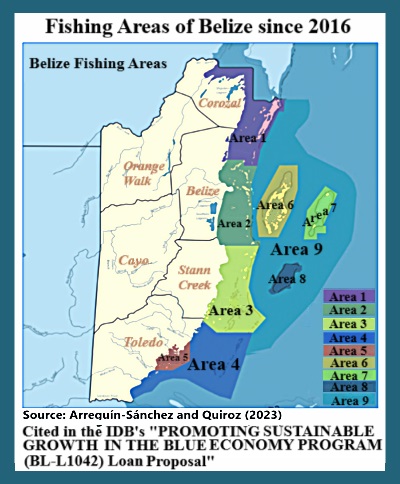
Based on data from the Coastal Zone Management Authority and Institute (CZMAI), Marine Spatial Plan Specialist, Jamani Balderamos describes Belize’s EEZ as 2.3 times larger than the territorial sea. In fact, it is bigger by about 2,215 square kilometers than our internal waters.
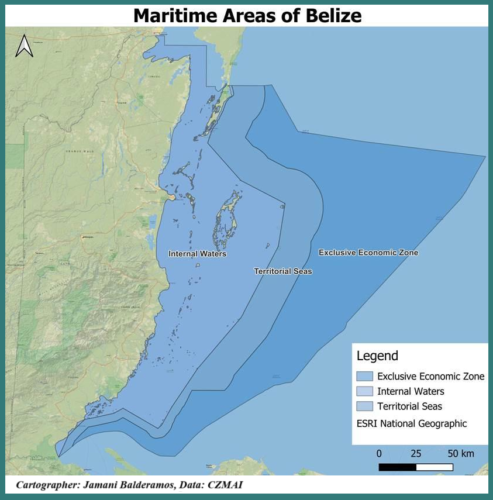
With our EEZ unstudied and largely unexplored, the biomass (volume of fish) which could exist there is presently unknown.
In some parts, you hit deeper areas of our territorial sea only about 200 yards away from the reef. Based on the catch from depths of up to 1,200 feet of territorial sea, many fishers believe there is greater bounty in Belize’s EEZ. Placencia deep sea fisher, Kurt Godfrey who has been responding to the lure of larger and better-tasting fish from the deep sea since the late 80s, spoke about the abundance. He fishes about one mile from the barrier reef in the Gladden Spit area using electric reels.
Given the rich returns from the deep areas of Belize’s territorial waters, local fishers strongly oppose the idea of allowing foreign fishing vessels (FFVs) in our EEZ.
However, as our laws currently stand, FFVs can, in fact, be approved to conduct fishing activity within our waters. See relevant sections below of the Fishing Resources Act of 2020.
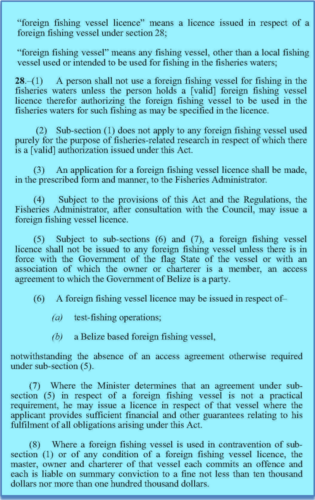
The Act mandates an access agreement with Belize for an FFV to be issued a commercial fishing license, but ministerial discretion can waive that requirement. Acting Fisheries Administrator Rigoberto Quintana is quick to affirm, though, that were the Government of Belize (GoB) to go that route, we would need consultation and guidelines first.
In our search, we learned that such guidelines already exist. FFVs can be approved to fish in Belize's waters under the stipulation that they will not “cause unreasonable harm to the local fishing industry,” and that the issuance of FFV licenses “shall be beneficial to the Belizean economy and shall be in the public interest.” Some requirements include regular reports to the Fisheries Administrator of total fish catch on entering and departing Belize and areas fished. They must also allow inspections and an observer to board the vessel.
Belize Government officials are pursuing deep sea fishing in our territorial sea and potentially the EEZ as an emerging sector. Already, fishers are forced to go deeper into our territorial sea as complaints of reducing fish stock mount, and catch per unit effort decreases. Discussions on deep sea exploration started before the COVID-19 pandemic and continued under the People’s United Party (PUP) on getting elected November 2020.
The Taiwan threat: a massive seafood appetite
In the last five years, if not more, there has been a running rumour among fishers and a suspicion among some conservation community members that GoB is thinking of or has approved Taiwan to fish in our EEZ for tuna – a highly sought-after, high-value specie particularly due to its use in sushi. So far, we have been unable to find a smoking gun that confirms this but we can explore all the reasons why it should never happen. So let’s look at Taiwan’s fishing profile.
The country - with a population of 23 million - has a voracious appetite for seafood – 26% higher than the world average according to the United States Department of Agriculture (USDA) in its Taiwan Seafood Market Update 2024. Eighty percent of Taiwanese consume seafood at least once weekly and over 40% consume it more than three times weekly.
But beyond their above-average seafood appetite, Taiwan is also one of the largest seafood exporters with an annual average production of 765,000 tonnes valued at US$1.39 billion, much of it sourced under EEZ access agreements with an estimated 30 coastal countries.
From Belize, Taiwan has sourced millions of dollars worth of seafood in the last decade, primarily lobster tail and lobster meat. Notably, the data also show that other fish were being imported in small quantities from 2013 to 2016.
Meanwhile, official data compiled in 2022 by Amelia W.J. Day, Taiwan’s Secretary General at the Bureau of Foreign Trade, showed lobsters constituted 68% of the 2021 Taiwan imports from Belize. Importantly, Day also shared that shark fins were imported from Belize in 2021. However, that data reference is absent from SIB statistics which is noteworthy given that shark finning is an extremely controversial fishery that involves sacrificing the entire animal only for its fins - a delicacy in Asian cultures. Belize regulates shark fishing but concerns of an illegal transboundary shark trade into Guatemala and Honduras persist. A prior report by The Reporter revealed that shark fins caught in Belizean waters were transported to Guatemala by the barrels. In 2019 a pound of shark fins was selling for US$100 in Guatemala.
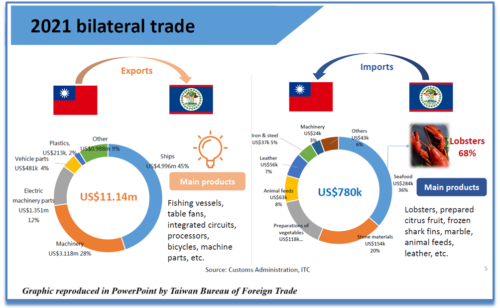
Day’s PowerPoint shows that Taiwan was importing much more lobster from neighboring Honduras, which has a small industrial fishing fleet of between 200-300 vessels primarily targeting shrimp and lobster. They also have a strong export of deepwater fish. Belize’s Taiwan lobster exports were at 0.87% and Honduras’ at 5.02%.
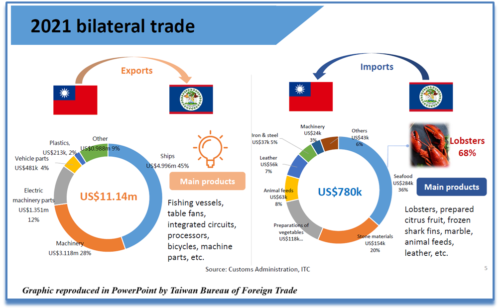
Notably, on her second visit to Belize, during a Special Joint Sitting of the Belize Parliament on April 3, 2023, then Taiwan President, Dr. Tsai Ing-Wen expressed interest in increasing seafood imports from Belize.
And while Taiwan is arguably Belize’s greatest diplomatic benefactor, providing Belize with technical assistance and seemingly boundless free development money, fisheries stakeholders are understandably concerned at the prospect of Taiwan fishing in our waters. For one, Taiwan’s distant water fleet – developed in the 50s and 60s when its own stocks were collapsing due to overfishing - is among the world’s top 5 largest. It features industrialized vessels of over 24 meters. Comparatively, the United States also consumes a large amount of seafood sourced mainly through imports, but its distant water fleet numbered fewer than 300 vessels in 2020.
In September 2023, the independent European Values Center for Security Policy cited Taiwan’s fleet at 2,000 vessels operating in the Pacific, Atlantic, and Indian oceans. The Taiwan fleet primarily uses long-line and purse seine methods for tuna fishing and supplies around 50% of the world’s tuna. Despite corrective actions, Taiwan was relisted for a consecutive time for unresolved human rights violations in the 2023 biennial report to Congress of the National Oceanic and Atmospheric Administration (NOAA) which is the United States’ lead organization on Illegal Unreported and Unregulated (IUU) fishing.
Research by Pauly et al. (2022) lists Taiwan among the top five countries driving transshipment particularly of large tuna and sharks. Transshipment, where goods are moved from one ship or mode of transport to another during their journey to a final destination, is flagged as murky behavior to obfuscate the origin of marine catch.
It’s worth mentioning that Taiwan investors have expressed interest in participating in Belize’s fisheries sector. In 2022, a delegation of Taiwan investors visited with Rainforest Seafoods Belize, a Jamaica-based company which also exports Belizean seafood to Taiwan. Interestingly, Rainforest was busted with over 3,000 pounds of undersized conch in 2023. Also of note here is that in their response to a joint Freedom of Information Act (FOI) request, the Fisheries Department redacted the entire portion regarding the out-of-court settlement with Rainforest on this bust. While the Taiwan investors visit might be classed as mere business pursuits, US Chargé d'Affaires to El Salvador, Jean Manes advises caution. In a 2021 panel discussion by the Center for Strategic and International Studies on IUU impacts in Latin America and the Caribbean she spoke about how bad actors seek to skirt the crackdown on IUU fishing. She believed countries would start “buying out rights, the fishing [processing] plants in countries…” to evade the fishing rights issue.
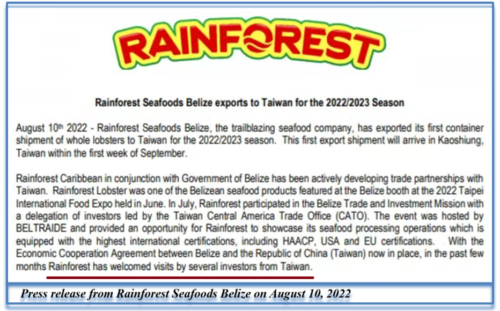
Taiwan’s selection for Belize EEZ stock assessment raises concerns
In September 2022, the Government of Belize announced Taiwan would help Belize conduct an EEZ stock assessment. Conservationists we spoke with questioned how Taiwan was chosen believing that other experts more familiar with our area – and without an IUU concern – could do the job. Responding on Taiwan’s selection in a separate FOIA request, the Acting Fisheries Administrator on August 16 stated simply, “This request was based on the established collaboration and technical expertise.”
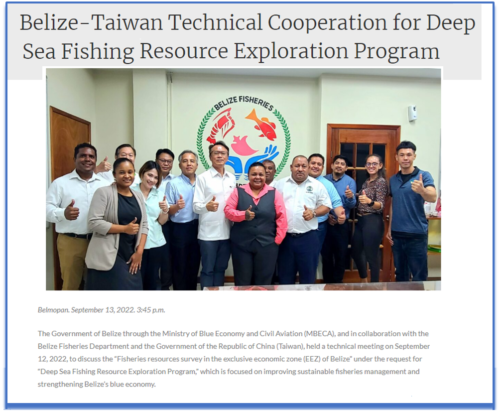
The announcement heightened suspicions of Taiwan having been approved to fish in our EEZ, with some likening it to “the rat minding the cheese.” Simultaneously, the Government was finalizing a US$7 million loan agreement with the Inter-American Development Bank (IDB) for a fish stock assessment but in our territorial sea. The loan includes US$1.684 million for matching grants of up to US$5,000 per fisher, to benefit 150-200 fishers. Fishers, individually or in groups, must contribute at least 20% (in-kind or cash) of their business plan’s total value. The loan contract was signed on February 20, 2024. They are just formulating terms of reference for consultants for the different activities.
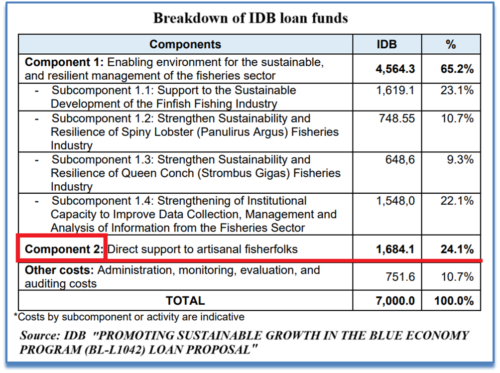
While the details of the IDB US$7 million loan are publicly available, murkiness surrounds the Taiwan EEZ stock assessment initiative.
In September and October 2022, the Belize Federation of Fishers (BFF) wrote the Acting Fisheries Administrator about what they titled the “Taiwan deep slope entanglement,” and expressed concerns about industrialized fishing which they reject. The BFF requested that any arrangements with Taiwan to explore Belize’s deep slope and EEZ be rescinded.
The response to the BFF did not quell their suspicions, and only reiterated that the technical mission by Taiwanese fisheries experts aimed to assess in-country capacity and resources for fishing in non-traditional areas. It was described as part of an effort to build “a strong cooperation with Taiwan for the sustainable development of Belize’s capture fisheries sector.”
In our investigation we came across a remarkable statement on FFVs by the Minister of Blue Economy, Hon. Abner “Andre” Perez at the first Belize Investment Summit in San Pedro in November 2021. The event had as its theme, “Belize: Open for Business”.
Off the record, a high level fisheries official downplayed the Minister’s statement as being said out of mere excitement and others, even in conservation, think too much is being read into it. However, some emphasize that word choice is important - as is context.
We were also pointed to a notable report titled “Belize IUU Risk Profile – March 2023” prepared under the UK Government’s Ocean Country Partnership Programme (OCPP) in consultation with the Government of Belize. Importantly, the research team walked away with the understanding that the Government of Belize foresees granting FFVs access if there was interest from investors and we are found to have commercial quantities of fish in our territorial sea and EEZ. The project team visited Belize in April 2022.
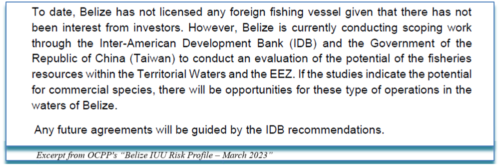
We sought comment from Julie Robinson, Belize Program Director for The Nature Conservancy (TNC) on the rumour of Taiwan being approved to fish in our EEZ. She had not heard it and considered it an outlandish thought. On the Minister’s statement and the OCPP report, neither of which she knew of beforehand, she said if GoB is planning on allowing FFVs in Belize, that should be incorporated in the ongoing marine spatial planning process which must also contemplate future uses of Belize’s marine space. She commented they would query this with Government because having any FFV come to Belize would “erode the fabric of who we are.”
When we brought the Minister’s statement to the attention of Janelle Chanona, Vice President of OCEANA Belize, her main question was, “Is the minister still attaching himself to that statement?” indicating that if he is, they would be concerned.
When we asked Minister Perez for an interview on the Taiwan EEZ rumour, his first reaction was to ask who raised the concern rather than state out-rightly that the Government has NOT and is NOT considering approving Taiwan to fish in our EEZ. When we resorted to a FOIA request, we were told that quashed any prospects of an interview as we had chosen to go the legal route.
The Acting Fisheries Administrator did respond to our Taiwan-related questions in a subsequent interview at an event on August 7, 2024 and he affirmed that no FFV has been approved to fish in our waters.
Since 2022, there has been no update on the Taiwan EEZ stock assessment initiative though Quintana said they are obtaining the reports from the two Taiwan technical experts who came to Belize in 2022 “to see what they’re recommending.” On August 21, we sent a Taiwan Freedom of Government Information Act request to the Embassy of Taiwan in Belize but had no response within the 15 days stipulated for approval or denial of a request. In a chance encounter, Taiwan Ambassador, H.E. Lily Li-Wen Hsu told us they were getting advice on whether the request was properly made but affirmed the information would nonetheless be provided. She also confirmed that the technical cooperation for a stock assessment in Belize’s EEZ is not off the table.
Quintana revealed in response to our Belize FOIA request that no minutes were recorded for the September 12, 2022 technical meeting with the Taiwan experts. Needless to say, this points to a lack of transparency and accountability as there would be no clear record of the discussions had, decisions taken and actions agreed. Belize is only one of 12 countries still supporting Taiwan. It is no secret that in order to maintain those alliances, Taiwan engages in diplomatic behind-the-scenes dealings that result in endless economic incentives for allied nations. For Belizean fishers and concerned conservation organizations, some of whom fear going on the record about their suspicions, the important question is: what is the quid pro quo for the patron state?
Already, the Government’s extreme murkiness surrounding the provision of data on the status of our shallow-water fishery has led to great mistrust. The Fisheries Department in February this year pushed back on fisheries stock data from renowned, independent, international scientists under the Belize Fisheries Project that point to a declining stock which requires urgent action. Former Minister of State for fisheries, Dr. Omar Figueroa who implemented a sea cucumber moratorium in 2017 told us, “If the Fisheries Department is saying that the reports are not accurate then they need to release the data that they have.” The data the Fisheries Department referenced in February 2024 was not disclosed upon inquiry until the joint FOIA request was sent by four journalists and the BFF on June 3, 2024. Still then, only reports (not raw data) were provided - more than three months late. Speaking about the Belize Fisheries Department, longtime Marine Conservationist, Roberto Pott stated, “And repeatedly we've had issues where they say that a study has been done, or they say that we know it's sufficient and when we ask for the data or the study, it's not available. And sometimes, even when the study is made available, when you go back and audit that research, you realize there are huge gaps, there are huge missteps in the methodology.”
Given Belize’s extensive Blue Bond commitments and its positioning worldwide as a blue economy leader with a focus on conservation and sustainability, as well as the critical need to uphold Belize’s longstanding ecotourism image, it is not difficult to understand why officials would find it hard to accept data that questions the viability of our fishing industry.
Belize fishers need meaningful help to pursue deep sea fishing
If the Government moves ahead with expanded deep sea fishing, our severely under-resourced fishers will require meaningful support to break the high barrier to entry. A larger proportion of the fishers we spoke with expressed interest in pursuing deep sea fishing if the Government mobilized it.
Sydney Fuller, Executive Director of the Belize Fishermen Cooperative Association (BFCA) entirely envisions a multimillion dollar collaboration between GoB and a foreign investor for Belizean fishers to even stand a chance at accessing our EEZ. However, he is clear that any partnership should entail Belizean fishers conducting the fishing themselves after being trained. He explained, “You'll be out there in the open. So we need larger vessels for that. And to get that, it takes a lot of money. But what can be done is maybe working with joint venture, with other people who have that. And that way, you'll be taking control of the product that is being harvested out there and be shared with Belizeans – than how it is at the moment: that they are just harvesting, raping, and take it away and you get nothing from it.”
TNC’s Julie Robinson pushed back on that idea emphasizing that time and again, it is only the big vessel owners who reap the huge profits.
Dr. Omar Figueroa pointed to the Blue Bond Belize fund and affirmed it needs to be used to empower our local fishers for EEZ access. He states, “We don’t need to entertain a foreign country, foreign organizations to come in there.”
When the time comes, whatever is decided on, the Fisheries Department must be transparent, accountable and inclusive in its decision-making - something that fishers find has long been absent. They highlighted this during the extensive research commissioned by the IDB as part of the loan process for the stock assessment in the territorial sea. There were consultations with fishers from Sarteneja, Belize City and Independence.
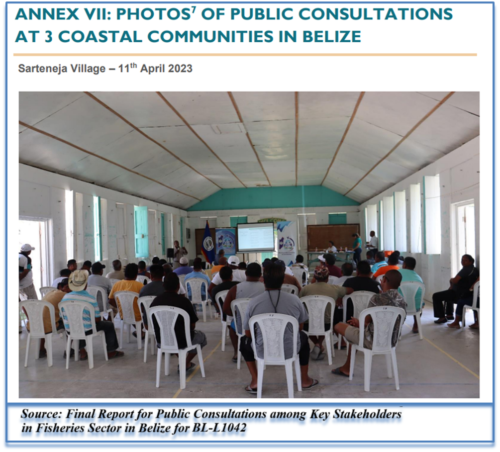
Fishers cited local and transboundary illegal fishing and transparency issues regarding past GoB and NGO projects, including mismanagement of funds. They also raised concerns about safety in light of an increase in sea piracy among others. On the latter point, consultant, Dr. Minerva Pinelo reported, “Belize Coast Guard representatives provided clarification about their resource limitations – i.e. fuel shortage which hinders their security role during the closed season making it increasingly difficult to patrol and detain illegal fishers along the coast of Belize.”
OCEANA’s Janelle Chanona declared: “It cannot be that Belizeans do not benefit from Belizean resources for lack of access…We can't go into anybody else's waters to fish, I can tell you that!”
Barranco fisher, Leslie Colon who is struggling to gather funds to transition into deep sea fishing said a Honduran fisher can source a vessel with lightning speed whereas it will take Belizean fishers years to do so. Conservationist Roberto Pott recalled that in the early 2,000s on establishing the Gladden Spit Marine Reserve, “…within months we were catching Honduranian fishers fishing within the spawning aggregation site that was closed. They fished at night. We caught them, took away their boat. They went to prison for three months and the following three months after they were released, we caught them again.”
Precedence spawns fear of GoB’s inability to police our EEZ
Financial limitations severely constrain enforcement of fishing laws in Belize’s internal waters and territorial sea. With a 2024-2025 fisheries budget of US$1.749 million (0.21% of the overall US$815 million budget) including a fuel allocation of US$149,864, the Belize Fisheries Department struggles to maintain regular patrols though it receives additional fuel allocations from some marine reserve co-managers.
Lack of resources is just one enforcement issue in Belize’s fisheries sector. Corruption and lack of will are also significant problems, involving both Belizean and foreign actors from Mexico, Guatemala, and Honduras. Over the years, reserve co-managers, Toledo Institute for Development and Environment (TIDE) and Southern Environmental Association (SEA), along with the Belize Coast Guard, have reported intercepting illegal fishers from Honduras and Guatemala.
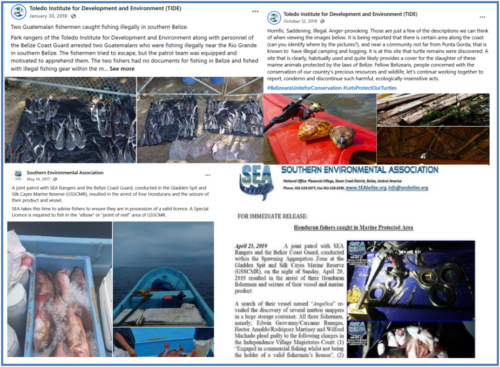
In a recent case, in June 2024, the Belize Coast Guard detained a Guatemalan national alongside a Belizean at Mother Bush Point south of Moho River with a 150-meter long line and six illegal sharks. Both were charged for fishing without a valid license.
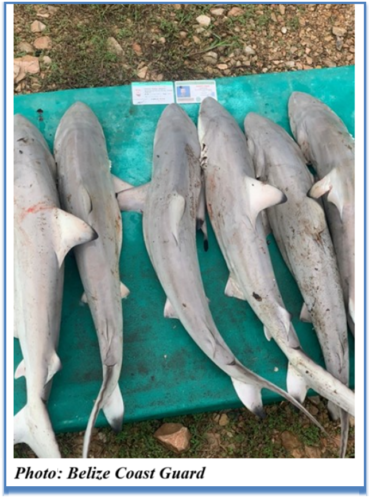
Ellis Guzman, Seine Bight deep sea fisher who fishes with hand lines in the Gladden Spit area stated, “And the Honduranians are always there, mostly when it's snapper season.” He added they can withstand the weather better due to their bigger vessels, better engines and more sophisticated equipment.
TIDE Protected Areas Manager, Ryan Moore concedes that the opportunity does exist for corruption out at sea because “there's no one there looking to see what you're doing. It's just between you and the fisher folks.”
One 2024 June afternoon we were shocked to hear about five Placencia fishers we happened upon by the seaside say that primarily illegal Honduran fishers and some Guatemalans access Belize’s deep sea mainly during Easter and at nighttime in the same areas used by Belizean deep sea fishers.
They claimed that the Hondurans bribe enforcement officers to look the other way. The particularly egregious, even incredulous method of bribery, they alleged, was beautiful women brought on one vessel to distract fisheries officers while the foreign fishers in multiple other vessels plundered Belize resources. Kurt Godfrey was willing to corroborate the allegation on the record.
When we put the serious allegation of bribery to the Acting Fisheries Administrator he declined to answer.
When we asked Dr. Percival Cho, former CEO in the fisheries ministry (March 2017-November 2020) if they ever received complaints of corruption regarding enforcement officers he shared there were “multiple instances of complaints” but that “it’s always difficult to get evidence against some corrupt personnel, people not doing the right thing…We get reports but nobody’s willing to really put their name on a statement.”
The idea of fish taken from Belizean waters by neighboring fishers and purchased by Belizean interests seems as incredulous as the bribery allegations. However, the claim was repeated by those Placencia fishers we spoke with by the seaside. Godfrey himself admitted he was once the hired captain who travelled to Honduras to buy seafood. San Pedro’s Mike Kuhn provided further insight into this practice in Belize’s tourism Mecca.
Like other EEZs, there’s a risk of IUU fishing in ours. Based on Automatic Identification System (AIS) vessel tracking, between 2018 and 2021, the OCPP recorded four fishing vessels, including one from Taiwan, entering a 50-mile buffer zone, with one vessel actually entering Belize’s EEZ, however, there was no evidence it was fishing. Officials could not tell us which vessel it was.
Notably, AIS signals can be turned off, making it unreliable for detecting fishing activity in Belize’s EEZ.
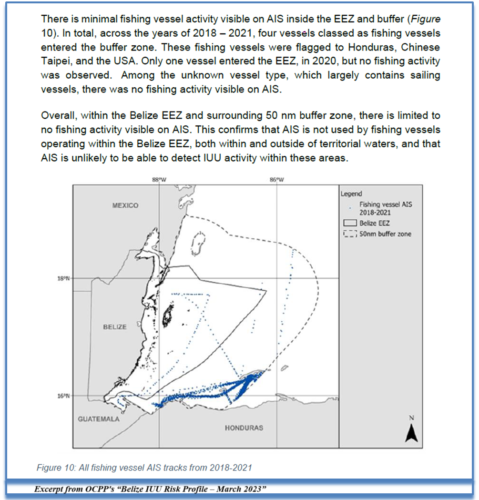
According to the OCPP report, most cargo and merchant vessels transiting Belize’s EEZ and buffer zone are from Liberia, Marshall Islands, Panama, and Singapore. Significantly, Miller et al. in research from 2018 highlighted that Taiwanese fishing vessels often associate with transshipment vessels flying flags of convenience, including Panama, Liberia, and Vanuatu. Panamanian-flagged transshipment vessels accounted for 59% of encounters with Taiwanese fishing vessels.
Fisheries experts also point to cargo vessels potentially carrying out IUU fishing during their journeys but follow-up is required by enforcement officials to corroborate AIS and satellite observations.
In August 2024, the Coast Guard acquired two military grade drones for EEZ overflights and awaits the two large vessels with a 500-mile patrol range. TNC’s Julie Robinson believes those still won’t be sufficient to adequately monitor our EEZ and says an effective collaborative enforcement effort with all stakeholders is necessary to pool resources. Roberto Pott notes we can put observers on the vessels but says there will always be bad actors that will require constant enforcement.

